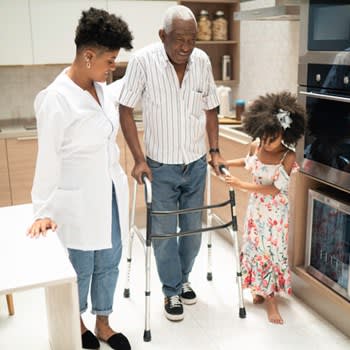Senior Guide to Treating and Living With Hearing Loss
Age-related hearing loss can seem like a struggle at first. Learn how to manage this condition with the right doctor, support from loved ones, and new technology.

Hearing loss is a common concern among seniors. Heredity, exposure to repeated or sudden loud noises, the process of getting older, and your genetics all contribute to hearing loss.
You may not notice the early signs of hearing loss, as higher or lower tones are harder to hear, or it becomes more difficult to follow conversations in loud rooms. However, this can become progressively worse, causing distress.
You may feel depressed and withdraw from social situations with friends and family because you struggle to hear them. As an older adult, your younger family, friends, or even caregivers may mistakenly believe you are being stubborn or unresponsive when you simply cannot hear.
It is important to know that you are not alone. In fact, one in three people ages 65 to 74 has some degree of hearing loss. About half of adults ages 75 and older have hearing loss.
There are many ways to manage this experience. Seniors can maintain their hearing for as long as possible and use assistive devices in certain situations. Treatment and management options may include:
- Regular exams to measure your rate of hearing loss.
- Hearing aids and other assistive devices.
- Training for certain situations, like reading lips.
- Some types of surgery.
- Some types of medication.
If you are concerned that you are losing your hearing, there are many options for help. You can work with your doctor to start managing your hearing loss.
Age-related hearing loss is called presbycusis. This type of hearing loss gradually occurs because of the aging process, especially due to changes in the inner ear and auditory nerve.
Unlike other forms of hearing loss, age-related hearing loss occurs at about the same rate in both ears. Since this loss is progressive rather than sudden, you may not realize that you are losing your hearing until someone comments on it or it becomes serious enough that you cannot hear regular conversations.
The basic signs of hearing loss include:
- Difficulty tolerating loud noises.
- Struggling to hear someone talking to you on the phone.
- Trouble following a conversation when two or more conversations are happening around you.
- Needing to ask people what they said repeatedly.
- Turning up the sound on the television, your headphones, or your car stereo, which then seems too loud to someone else.
- Trouble hearing foreground noises due to background noise.
- Thinking that other people mumble or hearing speech as more muffled.
- Trouble understanding when someone with a high-pitched voice speaks to you.
- Ringing in the ears (tinnitus).
Hearing loss ranges in intensity from mild to severe. The most extreme form of hearing loss is full deafness, but this is rare compared to other types.
The three basic forms of hearing loss are:
- Sensorineural hearing loss
Damage is caused to the inner ear and auditory nerve from illness, injury, very loud noises, or another cause. Because nerves and tissue are damaged, this form of hearing loss usually becomes permanent. - Conductive hearing loss
An obstruction in the ear (such as earwax buildup, an infection, or a growth) prevents sound waves from reaching the ear drum. Removing the obstruction typically results in restored hearing. - Mixed hearing loss
This combination of conductive and sensorineural hearing loss, such as from a long-term infection, can start with an obstruction but can eventually lead to nerve or tissue damage.
Loud noise is the leading cause of hearing loss, especially progressive hearing loss. For example, many baby boomers now have age-related hearing loss from too much unsafe loud noise throughout their lives, such as from going to loud concerts frequently as teenagers or young adults. Today, many people now listen to music on mobile devices with Bluetooth headphones, but it is possible to turn up the sound too loud on this devices, so be wary of potential hearing loss.
Some hearing loss is also related to chronic illnesses like diabetes and high blood pressure, which can affect older adults more than younger adults. As your immune system ages as you get older, you may become more susceptible to infections, so it is possible that you may experience more ear infections.
Brain injury, a tumor, a stroke, or a heart attack may also change your hearing. Older adults are also at greater risk of these conditions.
Some medications are ototoxic, meaning they can lead to hearing loss. Antibiotics for serious infections, cancer treatment medications, heart disease treatments, and even taking too high a dose of acetaminophen can lead to hearing loss.
If you have people in your family who have lost their hearing as they got older, you are more likely to lose your hearing as you enter your senior years.
You may feel embarrassed or worried as you start to lose your hearing, but there is nothing to be embarrassed about. Hearing loss is very common among seniors.
This loss may impact your quality of life until you find ways to manage it.
- Late onset of hearing loss due to aging can lead to struggles you did not expect. Problems having personal conversations can feel stressful or sad.
- Communicating with coworkers or in meetings can become more difficult, especially if you do not work in an environment where your coworkers can help you compensate.
- Some employers are resistant to hiring people with hearing loss. If you try to change jobs later in life, you may encounter additional discrimination. Know that you are protected by the American With Disabilities Act.
- You may find it difficult to communicate with your doctor, customer service and retail workers, government representatives, and other professionals.
- If you struggle to understand conversations when you did not before, you may blame yourself or feel like something is wrong with you that cannot be overcome. This can lead to depression.
Everyone adjusts to their hearing loss differently, but it is important to know that you have support and options for help. You may feel depressed, guilty, sad, or even go into denial about your hearing loss. The earlier you get treatment and support, the better your mental and auditory outcomes will be.
Getting help from a doctor to monitor and manage your hearing loss will also improve your outcomes. The right diagnosis will help you understand potential underlying causes and ways to treat or slow the progression.
Your general practitioner will likely refer you to an otolaryngologist, which is an ear, nose, and throat specialist. You may also work with an audiologist to undergo hearing tests, get hearing aids, or find other ways to manage hearing loss.
While hearing loss may impact the quality of your life at first, medical treatment and the support of your loved ones will relieve your burden. You may also join a support group, either online or in person, to talk with other seniors who have age-related hearing loss, so you can learn how they manage it.
As you learn to live with hearing loss in your senior years, you’ll find simple changes can greatly help you understand those around you.
- Virtual hangouts through video conferencing software
With so much of life in 2020 relying on video conference software, video chats on mobile phones, and other ways of communicating across distances, you may find that you struggle to manage reading lips or hearing sound. Although many software and mobile options have good video and audio quality, sound transmitted from a computer or smartphone microphone will not be as clear as in-person sound.
Internet or mobile data quality can affect how sound is transmitted too. Unfortunately, few of these programs offer captions that you can read.
Some video conferencing software has a chat feature, so you can have a relative, friend, or coworker translate the conversation into writing. With dialogue written out, you can follow and contribute. - Lip reading and sign language
You may benefit from working with an audiologist or speech-language therapist to learn how to read lips. Many people with significant hearing loss, who can hear sounds but not distinguish syllables, find that focusing on lips and body language can actually improve their ability to communicate with those around them.
Assistive listening devices are improving thanks to the boom in mobile technology. Some apps or programs on phones and computers can amplify sounds that electronic devices make.
Smart home technology may be able to adjust the lights in your home to let you know there is someone at your door. Tablets and phones have apps that can convert speech to text and vice versa. Closed circuit or hearing loop systems can be provided by movie theaters, places of worship, auditoriums, stadiums, and similar public locations.
Many countries have a form of sign language associated with their spoken language, and in the United States, people who have profound hearing loss or deafness benefit from learning American Sign Language (ASL). ASL is a separate language with its own grammar, so it can be somewhat difficult for older adults to learn. - Closed captioning options
Most electronic devices and services used for entertainment offer captions in some form, called closed captioning. Some television sets and channels offer CC as an option, and online streaming services offer CC. YouTube even provides CC for their videos regardless of who produced it and how long it is.
If you go out to a movie, concert, play, or other form of live entertainment, you are less likely to get closed captioning, but there may be other devices that can help you enjoy the music or dialogue. - Help from friends and family
Your loved ones can be vital in helping you manage your hearing loss. Here are some steps you can take so your friends and family can best support you:
- Tell your loved ones about your hearing loss, so they can understand if you struggle or fail to respond.
- Ask your loved ones to face you when they talk to you, so you can read their lips and expressions better.
- Ask those around you to speak louder without shouting.
- Ask people to speak more clearly, but not more slowly.
- Turn off noise-making devices like the TV or radio when you are not using them.
- Let others know that ambient noise, like music or talking in crowded spaces, may make it hard for you to hear clearly.
- Avoid sitting near speakers or televisions when you go out with a friend or family member.
Your friends or family may also benefit from support groups, so they can understand how you need to navigate the world. They can also get support from others going through the same experiences.
Medical Treatment May Include Medication, Surgery, or Hearing Devices
The medical treatment you receive may vary depending on why you are losing your hearing. If you experience a gradual loss of hearing in both ears due to aging, hearing aids are the most common device used to help.
In some cases, you may benefit from surgery. Your doctor will help you understand if this is necessary.
Ultimately, getting treatment for your hearing is beneficial on many levels. It will help you psychologically, and it is good for other parts of your health.
For example, your inner ear is involved in helping you balance. If you cannot hear very well, you may be at greater risk of falling. For seniors, that can lead to serious health consequences.
Hearing aids help many seniors who have hearing loss. You may think of hearing aids as bulky devices, but modern hearing aids can be nearly invisible.
Working with your audiologist and doctor can help you get the best devices for you, but there are many options you can ask about. For example, there are now over-the-counter hearing aids, which are regulated and safe to use. There are also prescription devices.
These are styles of hearing aids:
- In the ear (ITE)
- In the canal (ITC)
- Completely in the canal (CIC)
- Behind the ear (BTE)
- Mini behind the ear
A hearing aid is an electronic instrument that amplifies sounds, especially sounds that are closer to you, so you can hear more clearly and separate foreground from background noises.
You may need to try more than one style of hearing aid before you find the best option. Many hearing aids offer a trial period. Be sure that you understand the terms and conditions so you can change hearing aids if necessary.
Some health insurance companies cover the cost of hearing aids, but this is rare. Medicare does not cover hearing aids for adults. However, health insurance and Medicare will both cover the tests your audiologist or doctor need to run to diagnose and treat your hearing loss. You may choose to get an over-the-counter hearing aid to offset the overall cost.
Assistive Technologies Can Work With Hearing Aids
Assistive listening devices are another common way to manage hearing loss, and they may be recommended before hearing aids or for people with milder hearing loss. This may include a mobile app on your phone or a separate device to process some sounds.
As with hearing aids, your doctor and audiologist will help you find the best options for your situation.
Other devices or apps that might help include:
- Text messaging apps that can be used instead of making phone calls.
- Telephone amplifiers or an external speaker for your smartphone.
- Flashing or vibrating alarms.
- Infrared listening devices.
- TTY, or text telephone or teletypewriter.
- A sign language interpreter service using video conferencing software.
Biotech Options
For more advanced forms of hearing loss or deafness, biotech devices like cochlear implants and bone anchored hearing systems offer ways around damaged nerves or tissue.
- Cochlear implants
These small devices are electronic, and they are surgically implanted in the inner ear. The device then sends sound vibrations directly to the hearing nerve. This improves your ability to hear sounds, but you may not be able to hear very clearly. - Bone anchored hearing systems
These devices are also surgically implanted, bypassing the middle and inner ear, but they make use of your body’s ability to transmit sounds through bones, especially those near the ear drum. The sound processor in the device picks up a sound, converts it to a vibration, and transmits that vibration through the bones in your skull to your inner ear. - Auditory brainstem implant
This device bypasses the ear almost entirely and sends signals directly to the parts of the brain responsible for processing sound. Parts are surgically implanted inside the ear and then the brainstem. It is rare for older adults to receive this kind of device, as it is more beneficial for children who have profound deafness or hearing loss.
Combined Approaches to Manage Hearing Loss
When you have a medical condition like hearing loss, working with a hearing specialist is the first step. Devices like hearing aids can help you hear sounds better, and these are often the first step as seniors lose their hearing.
By combining hearing aids with other options, you can learn to live with hearing loss and still socialize and work. Supportive options include assistance from loved ones, using captions as much as possible, downloading special apps, and getting alarms that flash or buzz, especially emergency alarms like smoke detectors.
With so many approaches to hearing loss, your quality of life doesn’t have to suffer. You can combine various treatment approaches to feel good at work, converse with loved ones, and enjoy your life.
Hearing Loss: A Common Problem for Older Adults. (November 2018). National Institute on Aging (NIA), National Institutes of Health (NIH).
Age-Related Hearing Loss. (November 2020). MedlinePlus.
What’s to Know About Deafness and Hearing Loss? (June 2018) Medical News Today.
Age-Related Hearing Loss. (July 2018). National Institute on Deafness and Other Communication Disorders (NIDCD), National Institutes of Health (NIH).
6. Impact of Hearing Loss on Daily Life and the Workplace. (2004). Hearing Loss: Determining Eligibility for Social Security Benefits.
The Psychology of Hearing Loss. (March 2002). American Speech-Language-Hearing Association (ASHA).
The Hidden Costs of Hearing Loss. Johns Hopkins Medicine.
Hearing Loss Treatment and Intervention Services. (June 2020). Centers for Disease Control and Prevention (CDC).
Aging Changes in the Senses. (November 2020). MedlinePlus.


